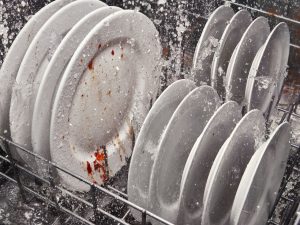Common Reasons for a Dishwasher Not Getting Water:
There are several possible causes for your dishwasher not getting water that you can explore before you call in professional help. These include:
- A Faulty Water Supply Valve: This is the typical cause for dishwashers not getting sufficient water. The supply valve ensures that hot water enters the machine. Should the valve stop working and it fails to open, you will be unable to clean your dishes.
- A Defective Door Switch: Although it appears to be a simple component, the door switch lets the dishwasher know that the door is properly closed and the machine can be filled with water. If the switch has a fault, the safety features of the dishwasher will prevent it from filling. You can use a multimeter to check the switch continuity.
- A Leak: If your dishwasher is built into your cabinetry, it may have developed a leak that is difficult to notice. If you can hear the sound of running water, but nothing is spraying to clean your dishes, you may have a serious leak that needs immediate attention.
- Incorrectly Positioned Drain Hose: In order to function properly, a dishwasher requires a drain hose to be at least 20 inches off the floor. If the hose is lower, it may siphon water out causing water supply issues. Fortunately, if you reposition the hose, the tub should start to fill correctly.
- Defective Float Switch: When the dishwasher is running and the water level reaches the correct height, the float triggers sensors to turn off the water supply. If your float is defective, it may be causing issues with the sensor and the water supply is not being signaled.
- Clogged Filter: Dishwashers have filters on their inlet valves to prevent debris from clogging the water supply. After continuous use, the filters can get clogged and this will prevent water getting through.
- Faulty Supply Line: If your wash cycle takes longer than usual and your dishwasher does not get enough water, it could be due to a break or kink in your water supply line. It may be possible to straighten out the supply line, but in case of significant damage, it will require replacement.
DIY or Professional Repair:
Although many of the issues we’ve covered above may be fixed as a DIY project, there are some definite advantages to hiring a professional appliance repair technician. Although DIY may seem like the quicker and cheaper option, a professional technician can often provide fast and convenient appointments to resolve any issues.
Since professionals have experience in dealing with all aspects of dishwasher repair, they are more likely to be able to quickly diagnose the underlying problem and offer a fast resolution. Additionally, if you’ve only watched an online tutorial, there is a risk that you may cause further damage when you attempt a repair. There is even a risk that you may cause yourself an injury.
Finally, a reputable professional will offer some form of guarantee of the quality of workmanship. This means that if the repair issue is not completely resolved and the problem reoccurs after a day or two, you can call them back to redress the situation, giving you peace of mind.
If your dishwasher is not getting adequate water or is otherwise not delivering proper cleaning results, you can rely on a professional appliance repair technician to help you.
